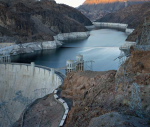The 'Age of Man'
 The official name for the geological epoch we are in now is the Holocene. But there is a movement among those who study such things to refer to the current stage of geologic time as the Anthropocene epoch, a term coined by Dutch chemist Paul Crutzen, which means “age of man.” This would seem obvious to historians, but in the context of global geology, does the presence of man make that much difference?
The official name for the geological epoch we are in now is the Holocene. But there is a movement among those who study such things to refer to the current stage of geologic time as the Anthropocene epoch, a term coined by Dutch chemist Paul Crutzen, which means “age of man.” This would seem obvious to historians, but in the context of global geology, does the presence of man make that much difference?Way back in the 1870s, an Italian geologist named Antonio Stoppani proposed that people had introduced a new era, which he labeled the anthropozoic. Stoppani’s proposal was ignored; other scientists found it unscientific. The Anthropocene, by contrast, struck a chord. Human impacts on the world have become a lot more obvious since Stoppani’s day, in part because the size of the population has roughly quadrupled, to nearly seven billion. “The pattern of human population growth in the twentieth century was more bacterial than primate,” biologist E. O. Wilson has written. Wilson calculates that human biomass is already a hundred times larger than that of any other large animal species that has ever walked the Earth.More and more, geologists are coming around to the idea that humankind has such an effect on the earth that we are, indeed, living in the Anthropocene epoch. Read the entire story at National Geographic in a feature article that is part of the year-long 7 Billion project.
In 2002, when Crutzen wrote up the Anthropocene idea in the journal Nature, the concept was immediately picked up by researchers working in a wide range of disciplines. Soon it began to appear regularly in the scientific press. “Global Analysis of River Systems: From Earth System Controls to Anthropocene Syndromes” ran the title of one 2003 paper. “Soils and Sediments in the Anthropocene” was the headline of another, published in 2004.

No comments:
Post a Comment